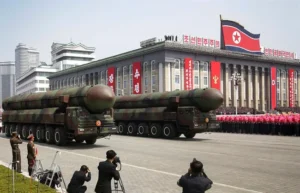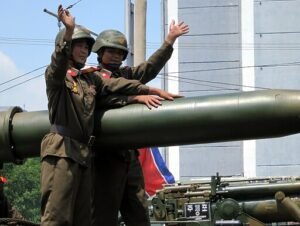
In a revelation of seismic proportions that has reverberated throughout the global security sphere, it has come to light that a multitude of remote information technology (IT) professionals, predominantly in the employ of American corporations, have purportedly been siphoning their hard-earned wages to the covert assets of North Korea, thereby inadvertently augmenting the nation’s clandestine armament endeavors. This revelation, publicly disclosed by the Federal Bureau of Investigation (FBI) in conjunction with the United States Department of Justice, has unveiled a cryptic facet of the cyber workforce, raising profound concerns encompassing security and ethical implications.
Delving into the Phenomenon

The operational mechanics behind this disconcerting revelation reveal that the North Korean government surreptitiously dispatched a cadre of highly adept IT professionals, primarily hailing from China and Russia, to perform remote duties for American enterprises. Their expertise in providing IT services was indeed commendable. However, the salient feature of this narrative lies in the alleged diversion of a substantial portion of their earnings toward North Korea. The labyrinthine routes through which these funds were funneled are presently under intense scrutiny, with numerous financial networks and intermediaries suspected of involvement in this intricate web of transactions.
The Staggering Magnitude of Financial Support
The magnitude of this financial influx is nothing short of stupefying. Collectively, these IT professionals were generating millions of dollars annually, thereby establishing themselves as a pivotal source of revenue for North Korea’s armament programs. This development raises pressing questions concerning the potential exploitation of remote IT labor and the ensuing global security ramifications of such activities.
The Tenacious Pursuit by the FBI
The investigative endeavors undertaken by the FBI have been characterized by meticulous attention to detail. Contractual agreements, financial transactions, and the intricate pathways along which funds flowed from these IT professionals to North Korea have been scrutinized with unwavering focus. The objective is to ascertain the extent of North Korea’s involvement, the potential complicity of American corporations, and the conduits facilitating these financial transfers. Court documents have lent credence to the FBI’s findings, further bolstering the credibility of these accusations. It is paramount to underscore that this investigation remains an ongoing process, with forthcoming information anticipated as it evolves.
The Significance of the Cyber Workforce
North Korea, renowned for its prowess in the realm of cyber warfare, has adroitly harnessed the capabilities of its remote IT labor force to finance its military endeavors. These individuals, proficient in diverse facets of information technology, have effectively assumed the role of North Korea’s discreet patrons, transcending mere financial gains to encompass North Korea’s reservoir of cyber expertise.
Revelations Unveil Profound Security Implications
The discovery of remote IT professionals clandestinely diverting their earnings to North Korea has catapulted grave security concerns into the limelight. North Korea’s ventures in weaponry, including nuclear aspirations and advancements in ballistic missile technology, have long engendered apprehension across the globe. The surreptitious involvement of remote IT labor, largely concealed from the public eye, in the financial bolstering of these endeavors, has added a layer of complexity to an already intricate issue.
Ethical and Juridical Dimensions
Beyond the domain of security, this revelation provokes pertinent ethical and legal quandaries. The utilization of remote IT personnel in such a manner, who may have lacked comprehensive awareness of the implications of their contributions, underscores concerns surrounding the exploitation of labor for endeavors bearing global security implications.
The Global Community Contemplates Its Response
As news of this revelation is disseminated, the international community engages in deliberations regarding the appropriate response. The United States is conveying a resolute message by pursuing legal action against those embroiled in this operation. Nevertheless, this development underscores the pressing need for enhanced regulation and oversight of remote workforces, aimed at averting inadvertent contributions to actions that undermine global peace and security.
The Role of North Korean Labor on Foreign Soil

It is imperative to recognize that North Korea has historically dispatched its workforce to foreign lands to augment the regime’s financial resources. Experts contend that forced North Korean laborers in China and Russia have historically constituted a pivotal source of revenue for Pyongyang. Nevertheless, the involvement of IT professionals within this context represents a relatively novel and substantial development.
Complex Landscape of Global Security
This revelation casts a spotlight on the intricate and interconnected nature of global security. The prevailing landscape is no longer solely defined by conventional military might; it is now equally shaped by dexterity in the cyber domain, the intricacies of remote labor, and the labyrinthine flow of finances. The continuation of weaponry initiatives through the unassuming efforts of remote IT practitioners serves as a stark reminder of the evolving challenges in safeguarding global security.
Prospective Implications

As investigations persist and the international community formulates its response, the narrative of remote IT professionals inadvertently funding North Korea’s armament endeavors promises to have far-reaching ramifications. This necessitates a comprehensive reevaluation of cybersecurity measures, labor protocols, and the obligations of nations to deter actions that jeopardize global peace and stability.
In summation, the disclosure of remote IT professionals diverting their wages to support North Korea’s weaponry program heralds the commencement of a new chapter in the annals of global security. It underscores the imperative for heightened vigilance in monitoring remote labor, bolstering cybersecurity protocols, and engaging in substantive discussions regarding the ethical concerns inherent in the deployment of remote workforces for potentially detrimental pursuits. The international community keenly observes the unfolding narrative and its implications for international relations and global security.










